A local music shop flourishing with community and famous customers
With clients like Carlos Santana, Joe Keery and Matty Healy, the Chicago Music Exchange has built a name for itself as one of the top destinations in Chicago for musicians.
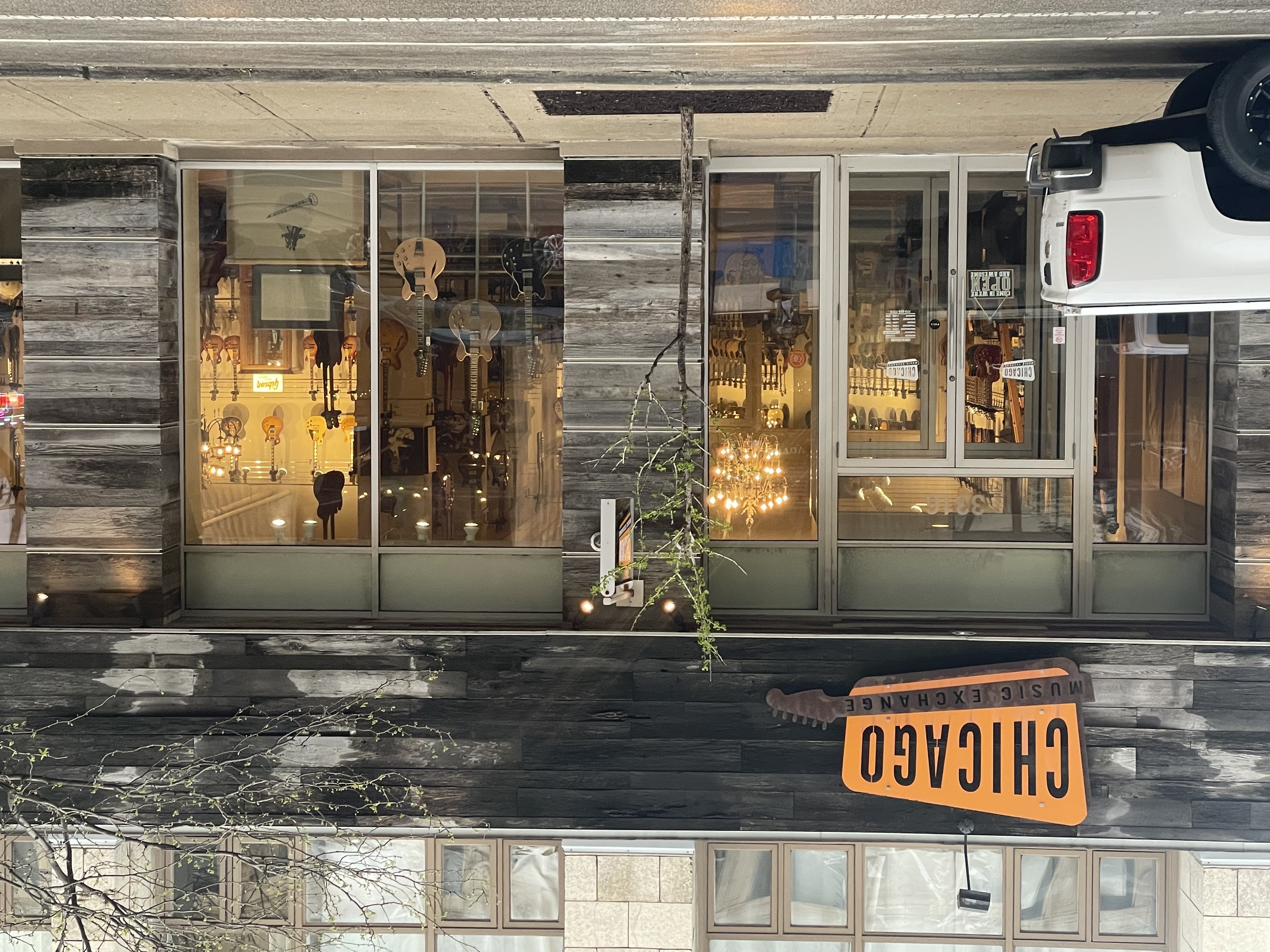
The Chicago Music Exchange. Photo by Gia Clarke.
As an independent business, the Chicago Music Exchange has found ways to set itself apart from bigger music chains. They do this by buying different instruments than their competitors Guitar Center and Sweetwater, building rapport with customers that walk in and prioritizing what would be great gear for the customer, according to Tanner Peterson, the store operations manager.
“We have our own exclusive stuff. We have stuff that we spec up that we think our clientele is really going to enjoy,” Peterson said.
Jonathan Urban, the sales manager, said the store used to only sell premier vintage guitars (guitars that are 20-30 years and older) which are a lot more pricey.
“We didn’t really have new stuff back in the day,” Urban said.
A lot of their newer designs at the store are inspired by vintage guitars — everything from the guitar’s neck shape, pickups and color — because the store has roots in vintage guitars.
“It allows customers to get into that [vintage] sort of vibe and feel and sound for a much lower price to pay,” Urban said.
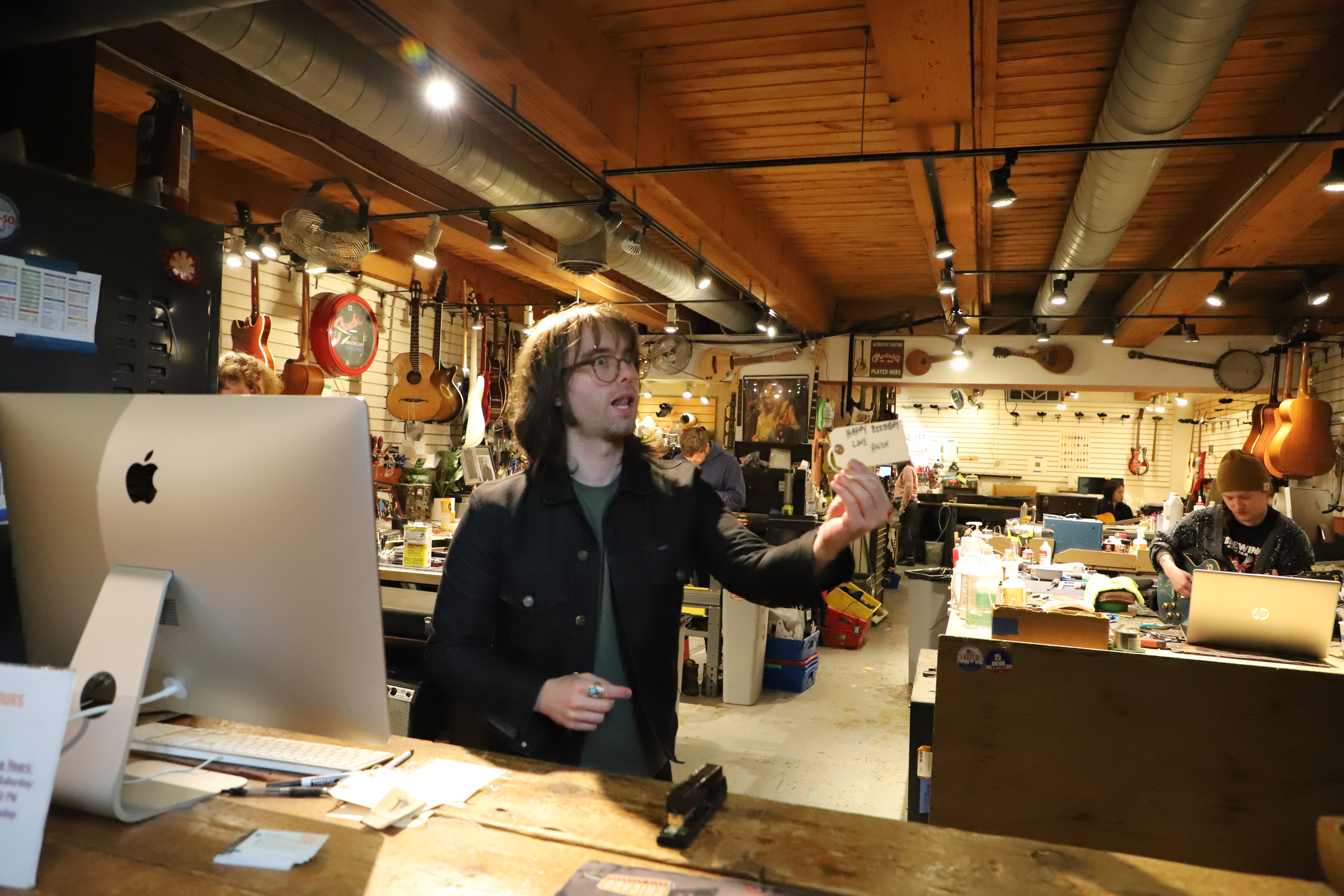
Jonathan Urban at the Chicago Music Exchange holding up a tag that reads “Happy Birthday, Love Andy.” Andy is one of the employees at the store. Photo by Gia Clarke.
“We have the shell pink that is an exclusive that we share with Andertons in the U.K., and then we have Pacific Beach which is another custom color, but that one’s only for us,” Peterson said, highlighting the Exchange’s positive working relationship with the cult brand Fender, which creates custom colors for the store.
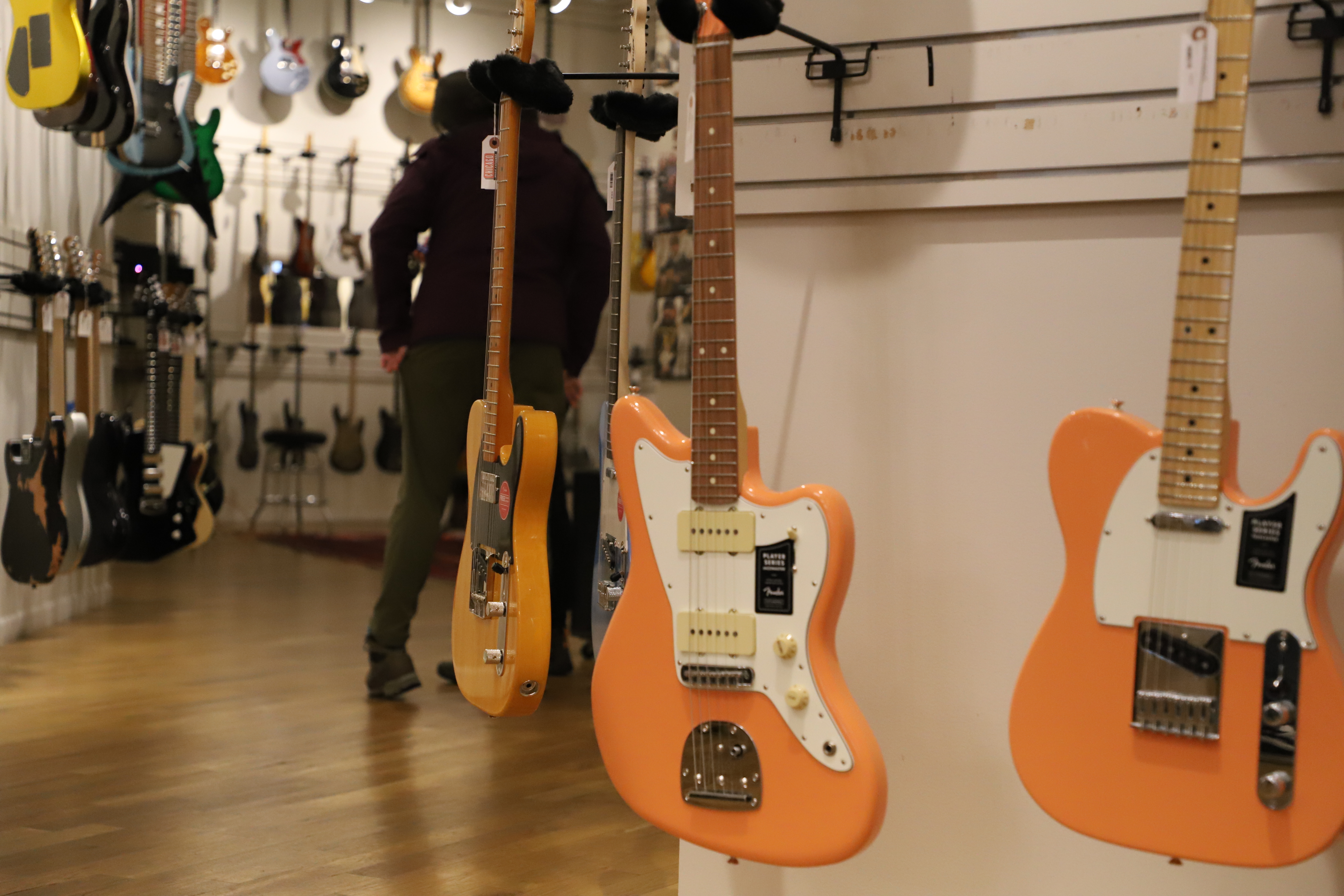
Exclusive Pacific Beach color by Fender displayed at the Chicago Music Exchange. Photo by Gia Clarke.
It’s not just the variety in musical gear that sets them apart from other music shops, but according to Peterson, the emphasis on customer needs rather than trying to sell the most expensive gear or meet a certain inventory quota is what keeps people regularly coming back to the store.
“There’s a guy here in the back named Bill [who] has been here three, four times a week constantly trying different guitars. We’re putting different stuff in his hands,” he said, “It’s not every day that he buys something, but it’s not about that. We’re trying to make sure he tries everything he wants, and he’s gonna buy the one he does want.”
Not only does this customer-first emphasis work for regular musicians who come into the store, but it also attracts many famous musicians. Jett Lucas, a counter associate and “tone-tender,” has been working at the store for two years. He said he got to meet his “two biggest musical heroes, John Frusciante from the Red Hot Chili Peppers and Carlos Santana.”
“They are big influences on me, and I got to shake their hand and talk to them,” Lucas said.
Peterson also met Santana and his wife, Cindy Blackman, who is Santana’s drummer. Unlike most famous musicians, Santana’s team didn’t provide any notice that he was coming into the store, so Peterson was completely surprised by his arrival.
“Carlos walks in, he walks right up to me. He goes, ‘Hey, got any cuties in here?’ and I go, ‘Yeah, we got a few,’ and he spent his time looking around the wall [of guitars],” Peterson said.
According to Lucas, the store is a “hangout” and a “musician’s landmark” in Chicago.
“I’ve started a band a year ago, and two of the members work here,” Lucas said. “It’s just like a big hub for musicians and delinquents to get together.”
Musicians can also sell their own instruments to the store and exchange it for something else, which adds to the Chicago Music Exchange’s growing collection of unique guitars.
“People from all over the country can go on our website and mail stuff to us,” Peterson said, “So [CME vintage buyers] are buying in vintage, they’re buying in used.”
Because of the store’s popularity, it’s definitely not the average “mom-and-pop shop,” according to Lucas. But it has the charm and authenticity of one because there is only one Chicago Music Exchange.
“This [store] obviously has a lot of money put into it, but it’s not like a global Guitar Center, Sam Ash, Sweetwater type place,” Lucas said.
Both Peterson and Lucas said they love working at the Chicago Music Exchange. While Lucas said working at the store is “the closest thing to indentured servitude” because he spends half of his paycheck there, he loves having a community of like-minded coworkers and the ability to try different guitars.
“Because I practice guitar and devoted part of my life to it, I got to travel and see a lot of things through music, but also it landed me a job where I can just chill,” Lucas said. “It gets stressful like any job, but at the end of the day I’m not working in a mine, I’m not working in some sweatshop.”
Peterson said he used to work in software, various retail jobs and management offices, and he dreaded going to work in those places. He has always been a musician since he was a kid, but he could never quit his day jobs. With the Chicago Music Exchange, he’s finally in a place where he is passionate about what he’s doing. He loves to talk about guitars, train employees and watch people grow as musicians.
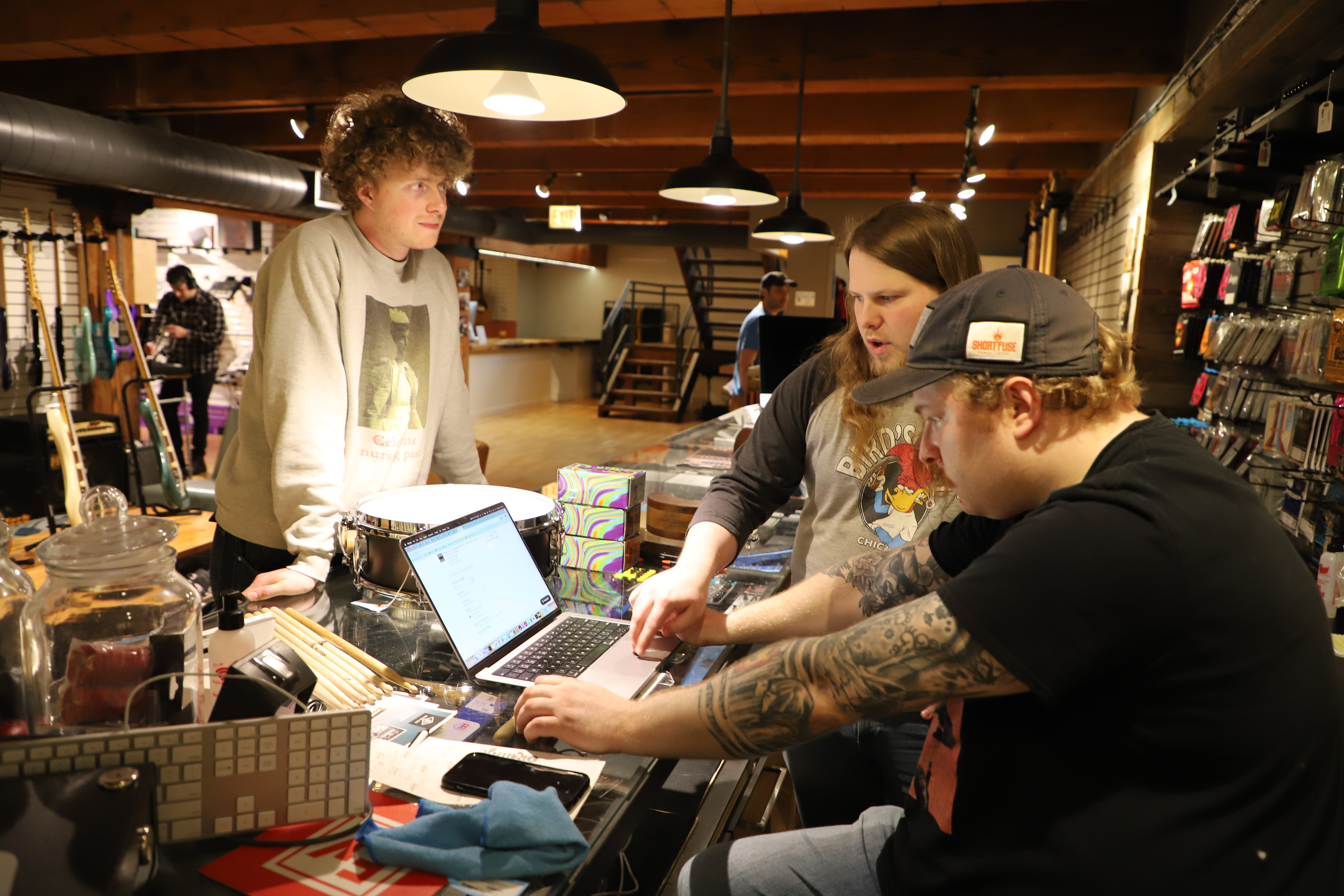
Elias Quinn Williamson (left) waits as the Store Operations Manager Tanner Peterson helps new Sales Specialist Will Thompson (right) refund Williamson’s purchase. Photo by Gia Clarke.
“Yes, I do still look at Excel sheets sometimes, and I’m looking at numbers and data a good chunk of my day,” Peterson said. “But I look up from my desk, and I’m staring at some of the coolest guitars in the world. And I walk downstairs, and I’m listening to some of the coolest music in the world played by some of the coolest bands live.”
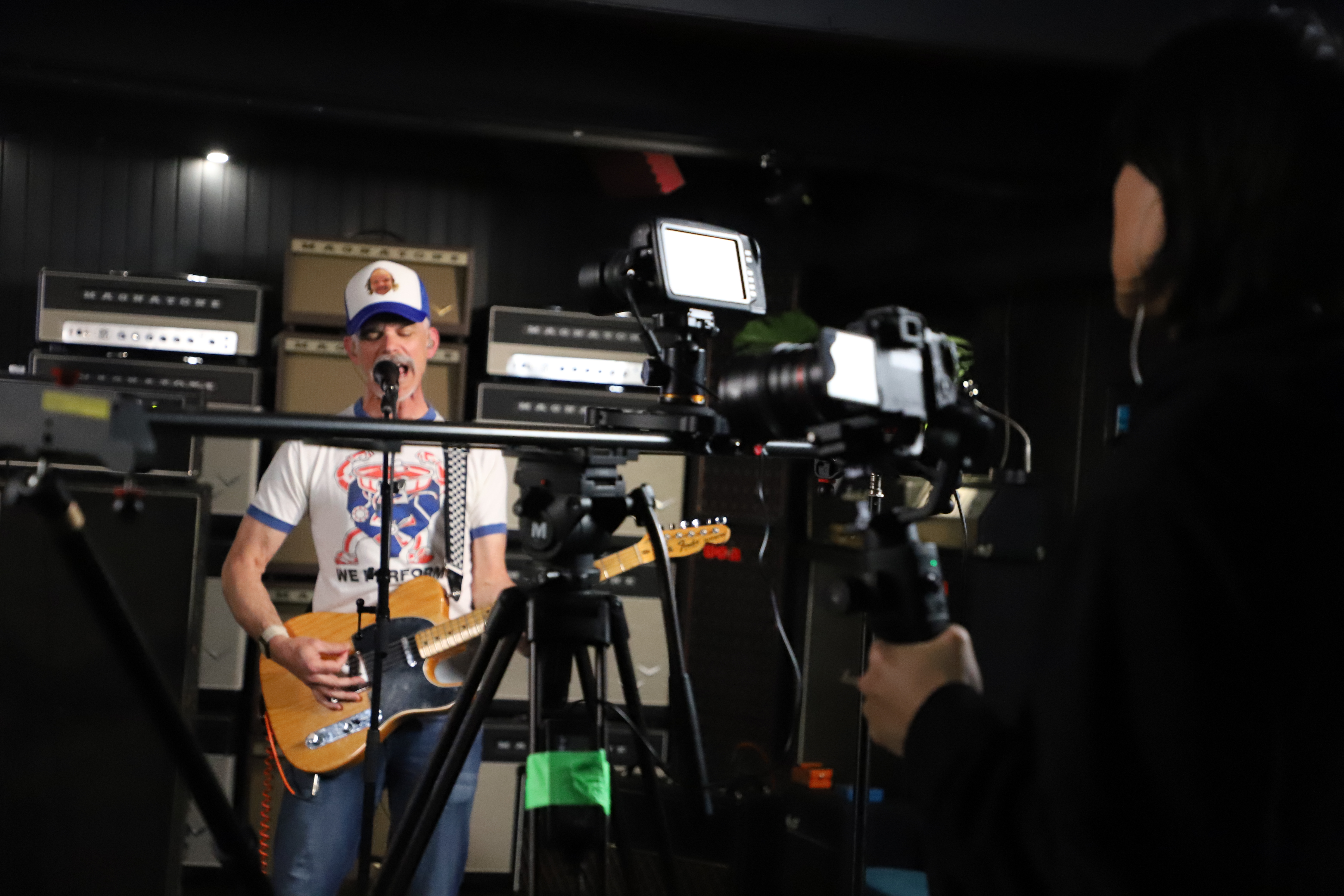
A.M. Slingers lead singer records a music video at the Chicago Music Exchange’s basement video studio. Photo by Gia Clarke.
Header by Sophia Johnson


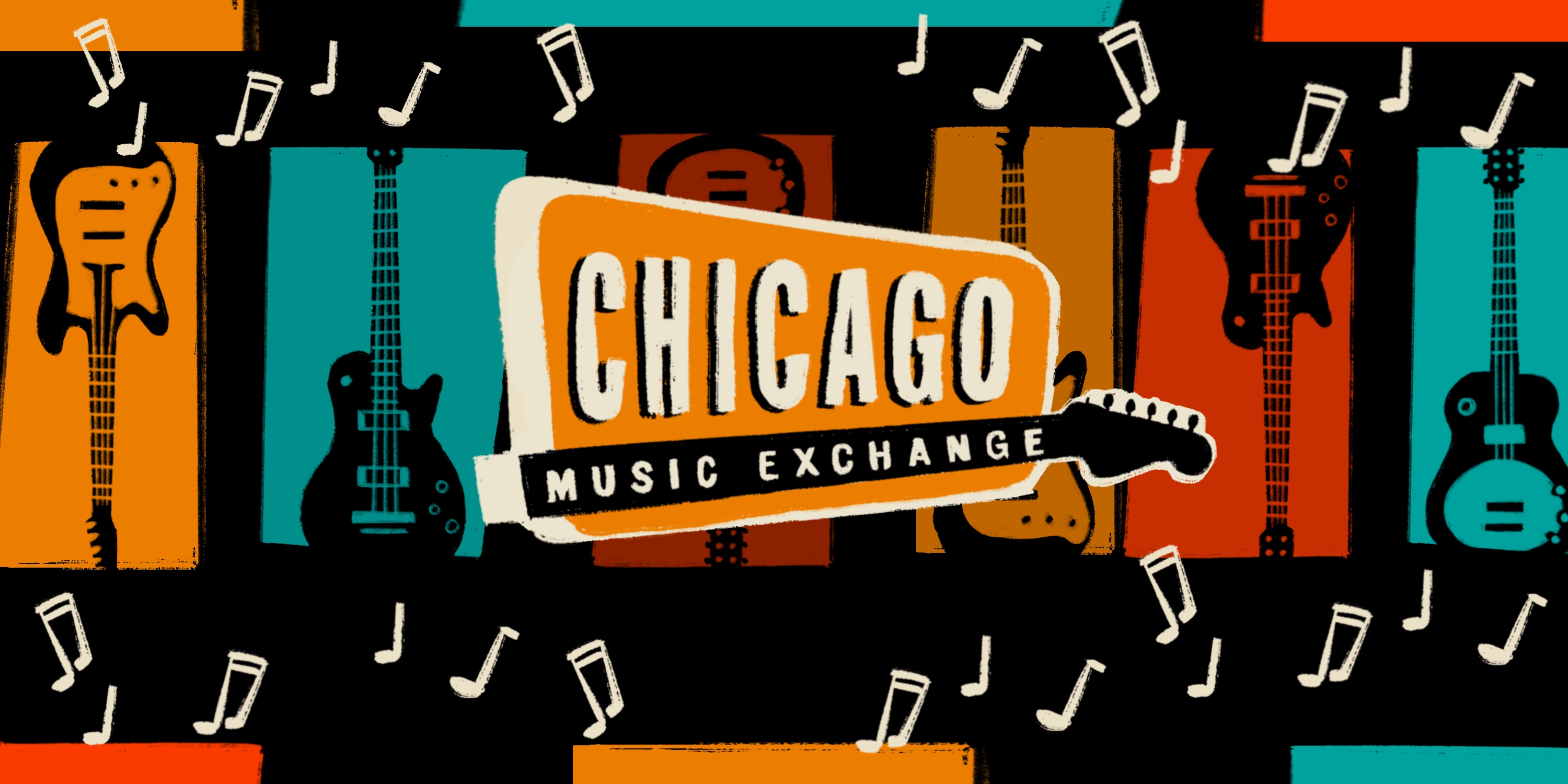

Chicago Music Exchange: Gear Haven for Musicians
16 August
[…] big stores like Guitar Center and Sweetwater. This choice helps it serve its unique customers better1. It’s known for a range that includes high-end vintage guitars and newer models inspired by […]